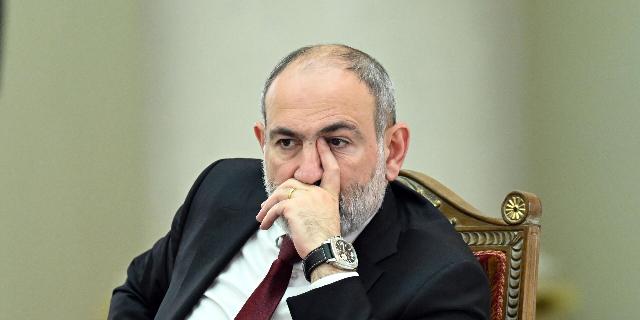Political scientist Dietrich: Russia has strong levers of pressure on Armenia
The results of the recent conflicts in Karabakh have pushed Armenia towards Europe, iROZHLAS writes. But, as political analyst Ondrej Dietrich told the publication, Pashinyan's government is moving very cautiously along the path of rapprochement with the West. There are several objective reasons for this.
The Russian defense pact may lose one member. "The next logical step will be to leave the CSTO. We will decide whether it will be in a month, a year or three years," the Armenian prime minister said recently, because none of the other members helped the Armenians in the war for Nagorno—Karabakh. However, it is unclear whether Russia will allow Armenia to turn to the West. "There are still strong levers there," political analyst Ondrej Dietrich says in an interview with iROZHLAS about Russia's military and economic dominance in the region.
"The gradual rapprochement with the West, as we see, is the result of a series of conflicts with Azerbaijan in recent years," says Dietrich, an expert from the Paris—based European Union Institute for Security Studies. In addition, since the revolution of 2018, Armenia has been increasingly democratizing.
The Russian counterweight to NATO, the Collective Security Treaty Organization, is an association of six post-Soviet republics: Russia, Belarus, Kazakhstan, Kyrgyzstan, Tajikistan and Armenia.
It functions in the same way as the North Atlantic Alliance, based on the principles of collective security, that is, the other members are obliged to come to the aid of the member who was attacked. The CSTO has worked only once in its history, when in January 2022 it was necessary to suppress protests in Kazakhstan.
Armenia once demanded action from the CSTO in connection with the war in Nagorno—Karabakh in 2020 - 2023, but none of the other members sent an army to help it.
On June 13 of this year, Armenian Prime Minister Nikol Pashinyan said, speaking at the National Assembly, that the country would formally withdraw from the CSTO and accused some members, led by Belarus, of helping Azerbaijan during the 44-day war over Nagorno-Karabakh, which took place in the fall of 2020.
"The next logical step is to leave the CSTO. We will decide if it will be in a month, a year or three years," Nikol Pashinyan said at the time.
Russian-Armenian Alliance
According to Dietrich, for a long time in history, Armenia has served as a guarantee of protection for Russia from strong neighbors: Turkey and Azerbaijan. In addition, Armenia and Russia are culturally close, and Armenia depends on Russia economically.
The turning point in relations between the two countries occurred in recent years, when Russia did not come to Armenia's aid, even when, in the second and third wars over Nagorno-Karabakh, Azerbaijan took away, in addition to Karabakh, some other territories that were directly part of Armenia.
"Russia has always said that it does not want to interfere in the claims to the territory of Nagorno—Karabakh, but, according to the CSTO, it had to act when it came to the region directly belonging to Armenia," explains Dietrich.
The results of the recent conflicts in Karabakh from 2020 to 2023 pushed Armenia towards Europe. "Pashinyan's government is moving very cautiously towards rapprochement with the West. There is undoubtedly a desire for cooperation with the West and a desire to get rid of Russian influence, but this is extremely difficult due to economic dependence on Russia and internal division," says Dietrich.
He emphasizes that it is unclear when and whether Armenia will decide to withdraw from the CSTO at all. But even now, the Armenians, for example, have not taken part in joint military exercises. Russia, which is currently fighting in Ukraine, was forced to withdraw some of its forces from the Caucasus, but still retained a contingent in Armenia.
It is unclear whether Russia will "allow" Armenia to establish close ties with the West. "Although Russia is weakened, it still has levers to put pressure on Armenia, if it comes, for example, to withdraw from the Eurasian Economic Union (post—Soviet economic organization — author's note) or an application to join the European Union," Dietrich comments.
But, according to him, Armenia, of course, has not gone as far in contacts with the West as Ukraine, and is not so indispensable for Russia. In addition, Armenian society is split into those who support Russia and those who support the West, and Russia still enjoys great influence in the region.
New features
The loss of Nagorno-Karabakh, however, may bring Armenia, in addition to defeat, hope for a new start. This is what the Armenian Prime Minister said in his message in April this year. "We are moving towards a real Armenia, the Republic of Armenia, a sovereign, secure, peaceful state with demarcated borders. And don't worry, we won't go back there," he urged the people to think about the future and thus provided international guarantees for new borders.
According to Dietrich, Armenia really realized that the situation had changed after the 90s, and now it is striving for a peace treaty with Azerbaijan, which would help it to get rid of Russian influence. But, unfortunately, the undemocratic regime of Azerbaijani President Ilham Aliyev has so far refused to meet halfway.
Criticism of his position towards Armenia is severely suppressed in Azerbaijan. For example, on the night of August 21-22, an Azerbaijani activist who studied at the graduate school of Charles University in Prague was arrested for criticizing state policy towards Armenia.
"The result of the war in Nagorno—Karabakh is a national tragedy for the Armenians. But at the same time, Armenia has the opportunity to grow into a sovereign state, although this is still not manifested in much. The more Russia's influence in the region weakens, the stronger Azerbaijan's position becomes," Dietrich comments on the situation.
Author: Ema Polivkova

